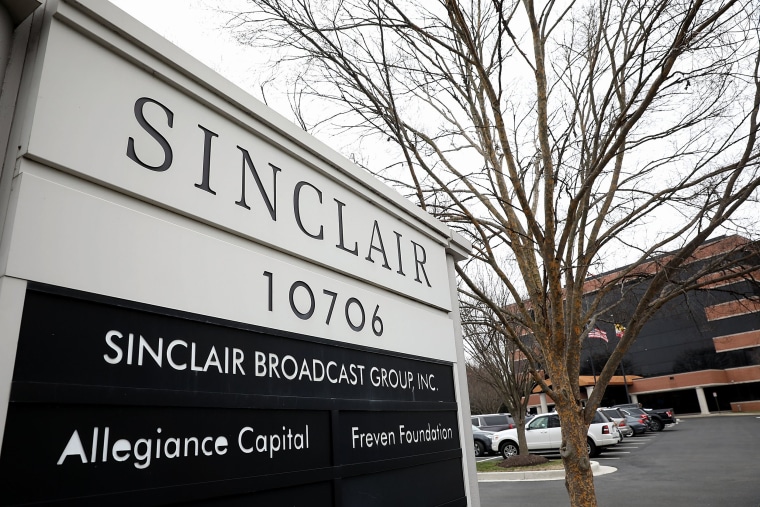A year ago, Sinclair Broadcasting Group appeared to have the world at its feet.
Sinclair, the owner of more than 190 local TV stations, had struck a $3.9 billion deal in May 2017 to acquire Tribune Media's 42 local TV stations, extending its already sizable reach into American homes.
Even better for the company, the Federal Communications Commission was discussing loosening local media ownership caps. Media experts wondered if Sinclair could soon rival Fox News in the conservative media world. Sinclair's vision of becoming a national player — with a formidable ally in President Donald Trump — was coming into view.
Sinclair had one last hurdle to jump. The Department of Justice told Sinclair it would approve the deal if the company sold off Tribune stations in markets where Sinclair already had a presence. Sinclair agreed and lined up buyers.
Those buyers, however, had close ties to Sinclair executives and would allow Sinclair to continue to operate many of the stations. That wasn’t the kind of divestiture the Justice Department was looking for, and Sinclair’s maneuver would prove to be its undoing.
The beginning of the end of the merger came in July when FCC Chairman Ajit Pai said he had “serious concerns” about the divestitures, despite to that point having done little to challenge the acquisition.
“The evidence we’ve received suggests that certain station divestitures that have been proposed to the FCC would allow Sinclair to control those stations in practice, even if not in name, in violation of the law," Pai said in a statement.
When the FCC voted to send the merger to an administrative judge, Sinclair’s deal was effectively blocked.
Now, Sinclair faces significant legal challenges related to the failed deal, a battered reputation and competitors eager to buy up local stations and challenge its dominance.
Sinclair said in a statement to NBC News: "We unequivocally stand by our position that we did not mislead the FCC with respect to the transaction or act in any way other than with complete candor and transparency."
Tribune disagrees. On Thursday, it filed a $1 billion breach of contract lawsuit against Sinclair over the failed acquisition.
In a staff memo, Tribune Media CEO Peter Kern accused Sinclair of engaging in "belligerent and protracted negotiations" with the Department of Justice and the Federal Communications Commission, and said Sinclair "refused to sell stations in the 10 specified markets required to obtain approval."
The Tribune lawsuit isn’t the only threat Sinclair faces from the failed merger. It is still the subject of a Department of Justice investigation into whether ad teams at Sinclair and Tribune shared information. A Sinclair spokesperson at the time said it understood that the investigation involved the broadcast industry at large.
On Tuesday, two members of the House Energy and Commerce Committee, Frank Pallone Jr., D-N.J., and Mike Doyle, D-Pa., wrote to the FCC to request it look into allegations about the close relationship between the two company's ad sales operations. The House members also requested that if either the FCC or DOJ find that Sinclair or Tribune engaged in illegal activity during the pending merger, the FCC should keep the findings in mind when re-evaluating the Sinclair's existing broadcast licenses.
The FCC inspector general is reportedly conducting an investigation into the relationship between Pai and top Sinclair executives. A spokesperson for the inspector general’s office declined to comment on the probe.
The Tribune deal also put Sinclair in the media spotlight in a way that it rarely had been before. Sinclair was best known for airing segments of a documentary in 2004 that was critical of then-presidential candidate John Kerry’s anti-war testimony and accused him of lying about his service. The company otherwise operates with little public fanfare.
Its presence in U.S. media, however, is expansive. Local TV remains one of the main ways Americans consume news, and Sinclair owns or operates more than 190 local broadcast TV stations.
The prospect of Sinclair adding to that portfolio put media watchdogs on alert and led to renewed focus on the company’s conservative leanings. HBO’s John Oliver made fun of the company for its "Terrorism Alerts" and its use of former White House staffer Boris Epshtyn for opinion segments. Sports-focused website Deadspin published a video mashup of local anchors reading a Sinclair-directed script about “false news” that went viral.
Sinclair isn’t done just yet. The company still has plans for a streaming news service called STIRR, according to a report from BuzzFeed, though a TV agent who asked to remain anonymous because of contractual agreements said conversations with talent had been put on hold in recent weeks.
And the company still has Trump in its corner. The president tweeted in July that the FCC had been “unfair” in preventing the Tribune deal.
Karl Frisch, executive director of consumer watchdog organization Allied Progress, said the end of the deal was a good thing, but to expect Sinclair to mount a comeback.
“The collapse of this merger is as major a victory for American consumers as it is a defeat for the propaganda pushers at Sinclair,” Frisch said.
“Sinclair isn’t likely to learn the right lessons from the collapse of this merger,” Frisch said. “They will be back.”

